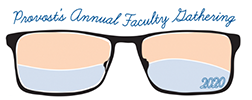Breakout:
The Science of What Makes People Care About Science
Time: 11 a.m. Breakout
Location: Phillips Center Studio Theater
The scientific evidence is piling up: people don’t act on information, they act on what they care most about. We’ve distilled six core principles from behavioral, cognitive and social science that you can apply to help people care more about your work. In this lively and hands-on session, participants learn to apply these rules to their own work and leave with a science-based framework for approaching new communications challenges.
Session type: workshopLearning Objectives:
- You will learn the importance of communicating from the perspective of your audience
- You will be identify new metaphors that can help others understand your work.
- You will learn to tell more compelling stories about your work.
Speakers & Panelists
Ann ChristianoAnn Christiano is the Frank Karel Chair in Public Interest Communications and director of the Center for Public Interest Communications. As Karel Chair, she is developing a first-ever curriculum in public interest communications, connecting practitioners and scholars who are already working in the field, and nurturing and sharing research that can advance this newly emerging academic discipline. Public interest communications uses science-driven strategic communication and storytelling to advance positive social change. Ann directs the frank gathering, which brings together hundreds of leaders from around the world who are working at the front lines of social causes, as well as scholars and funders to share the best of what they know in Gainesville every February. Before she came to the University of Florida, Ann was a senior communication officer for the Robert Wood Johnson Foundation, where she directed communication efforts for programs that address the social factors like housing, education and mental health that drive health and well-being. Ann’s writing has appeared in the Stanford Social Innovation Review and Quartz and she was the University of Florida’s Teacher of the Year in 2014. Her work through the Center includes partnerships with the United Nations High Commissioner on Refugees, The Department of State, and several agencies that work in this domain. She has worked with several federal agencies, the Gates Foundation, and nonprofits and other foundations throughout the United States. She regularly trains scientists and other leaders to more effectively convey the importance of their work.
Annie Neimand
Annie Neimand is the director of research for the Center for Public Interest Communications, housed in the University of Florida College of Journalism and Communications. As the director of research, she works with organizations to apply behavioral, cognitive and social science to their work. Center partnerships include the United Nations High Commissioner for Refugees Innovation Service, The United States Department of State, and public interest communications agencies in the United States. For five years, she has led the research arm of frank, an annual meeting in Gainesville that connects practitioners, funders, scholars and activists working on public interest communications around the world. In this role, she connects the field of public interest communications practitioners to research. She is part of the frank Academy Training team, where she integrates research from a range of academic disciplines into communication trainings for scientists and non-profit leaders. Trainees have included the Bill and Melinda Gates Foundation, National Academy of Medicine, scientists and program officers at the National Institute for Food and Agriculture; University of Florida scientists, program leaders and educators; and many foundation and nonprofit communicators. Her writing has been featured in the Stanford Social Innovation Review, The Conversation, Quartz, Salon, The Huffington Post, and Newsweek. Annie is a trained qualitative researcher, with expertise in interviewing, focus groups and ethnography. Her areas of study include the social and psychological underpinnings of public interest communications, science communication, and social movements.

